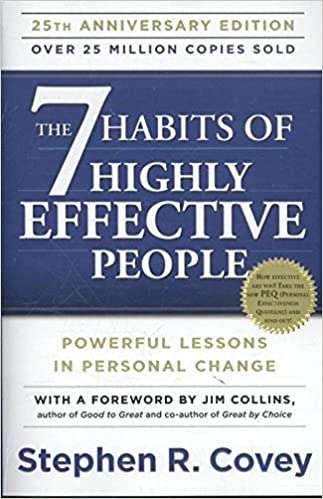I just finished reading The 7 Habits of Highly Effective People by Stephen Covey. Here’s my very brief summary and at the end I’ll list my actionable takeaways.
I’m doing this as an exercise to help retain and understand the content better.
Overview
The first 3 habits are personal, they’re about your “private victories.” Habits 4, 5, and 6 are in relation to others, they’are about your “public victories.” Then there’s one last habit that caps it all off.
Habit 1 – Be Proactive
Habit 1 is about the space between stimulus and response. As Victor Frankl concluded, “between stimulus and response, man has the freedom to choose.” Choosing how you respond means being proactive.
Being proactive means taking advantage of this space between stimulus and response, about subordinating your feelings (i.e. stimuli) to your values.
He also describes how we all have scripts (like computer program “scripts”) that are running inside of use that cause us to think and act in certain ways. This first habit says that everyone has the ability to change that scripting, to change how you see and act in the world, the very base level of your programming.
Habit 2 – Begin With The End In Mind
Habit 2 is about coming up with those values from Habit 1. It’s about creating your personal mission statment, which encompasses your character, contributions, and achievements.
Begin with the end in mind means to come up with what you value the most and the guiding principals that will help you develop your character (what you want to be) and your contributions (what you want to do).
Habit 3 – Put First Things First
Habit 3 is about doing the work, putting the important things (whatever you end up valuing in Habit 2) first and learning how to delegate responsibilities for anything that isn’t the most important.
Subordinating your feelings and emotions to your values requires a purpose, a mission, a sense of direction.
Habit 4 – Think Win/Win
Habit 4 is all about your human interactions. Aim for a win/win character, relationships, and agreements.
The Win/Win paradigm is about choosing things that benefit both you and the other party.
There are 3 character traits that are required for the Win/Win paradigm: integrity, maturity, and an abundance mentality. From building upon a foundation of character, we can build Win/Win relationships with those around us.
Habit 5 – Seek First To Understand, Then To Be Understood
Habit 5 is all about empathetic listening and building relationships on openness and trust. Improving the actual skill of empathetic listening involves 2 things: rephrasing content and reflecting feeling.
After seeking to understand, you need to learn how to be understood. You can be better understood by increasing the credibility of your ideas. This involves presenting your ideas clearly and within a deep understanding of other peoples’ paradigms and concerns.
Habit 6 – Synergize
Habit 6 is all about leveraging people and relationships in the creative process and creating an environment where you can come up with a better alternative than compromise. If you both disagree, is there a third alternative in which you both can win?
Creating the ideal environment for synergy involves: a high Emotional Bank Account, thinking Win/Win, and seeking first to understand.
While in these synergistic environments, you must value the differences in other people. Realize that they see the world not “as it is” but “as they are.” You don’t have to agree with them, but valuing their differences means to valuing and affirming their understanding.
Habit 7 – Sharpen The Saw
Habit 7 is the cap on all the other habits. This habit is about taking the time to sharpen the other habits. It is the habit that makes all the other possible. It’s about personal PC (production capability).
The 4 dimensions of this habit include: physical, spiritual, mental, and social. Train these skills as they support the rest of your life.
My Takeaways
- Achieving what I want to achieve (freedom, security, optionality) requires learning to subordinate feelings to values. As feelings and emotions arise, I’m going to remind myself that “feelings don’t require actions,” meaning, just because I feel some way doesn’t mean I need to act in that way. I’ll begin to detach myself from my emotions and be more proactive about taking action upon my values (character and contributions).
- Creating wealth and impacting the lives of others requires a mindset of abundance, not scarcity. I learned the paradigm of “Win/Win” in which both parties of an agreement/transaction walk away better than before. When I feel my scarcity mindset bubbling up, I’ll remind myself of this “Win/Win” paradigm.
- Producing something (P) requires the capability to produce (PC), a simple enough statement. My production capability right now is low, so I’m going to start valuing (through time and dollars) things that increase my production capability (PC) so that I can produce (P) more in the future.
- Empathetic listening develops relationships. In social interactions I’m going to start noticing the feelings and body language behind people’s words. If I’m in a longer or deeper conversation, I’ll try rephrasing content and reflecting feelings.


There’s a reason that book is a classic. Glad you dove into it. Big Win-Win believer here.